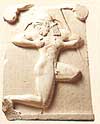Trade and the Colonies
 The Greek city states sold their surplus goods by trading with each other and with
other lands around the Mediterranean and Black Seas. There were no large trading
companies. Each merchant usually had his own ship. Some traders were rich enough to
finance their own deals, but many had to borrow from bankers. In Athens, many of the
richest traders were metics (foreigners). They were forbidden by law to own land, so many
invested in trade abroad. The Greeks travelled far in search of trade. The goods were
usually sent in sailing ships. To navigate, they used the stars and well-known landmarks.
The main exports from Greece were wine, olive oil and manufactured goods, such as cloth,
pots and statues. Imports included grain from the Black Sea, copper, tin, timber and goods
from Africa and the East, such as ivory, incense, spices, perfume, silk and slaves.
The Greek city states sold their surplus goods by trading with each other and with
other lands around the Mediterranean and Black Seas. There were no large trading
companies. Each merchant usually had his own ship. Some traders were rich enough to
finance their own deals, but many had to borrow from bankers. In Athens, many of the
richest traders were metics (foreigners). They were forbidden by law to own land, so many
invested in trade abroad. The Greeks travelled far in search of trade. The goods were
usually sent in sailing ships. To navigate, they used the stars and well-known landmarks.
The main exports from Greece were wine, olive oil and manufactured goods, such as cloth,
pots and statues. Imports included grain from the Black Sea, copper, tin, timber and goods
from Africa and the East, such as ivory, incense, spices, perfume, silk and slaves.
The colonies
 At the time
of the Dorian invasions, many people left Greece and set up colonies in ionia, on the west
coast of what is now Turkey. The next wave of colonization began in the 8th century BC. A
rise in population had led to a serious shortage of farming land and many left to seek
their fortunes abroad. Families of emigrants set off with animals and supplies of food and
seed for planting. They settled in largely uninhabited areas and built new cities,
modelled on the Greek ones. The new cities provided raw materials and markets for Greek
goods. They were completely independent, though fellow Greeks sometimes came to their aid
when they were threatened by enemies. A tribe called the Graii settled in Italy. The
Romans later called them Graeci. This word came to be used for all who spoke their
language, and from it comes out the word "Greek".
At the time
of the Dorian invasions, many people left Greece and set up colonies in ionia, on the west
coast of what is now Turkey. The next wave of colonization began in the 8th century BC. A
rise in population had led to a serious shortage of farming land and many left to seek
their fortunes abroad. Families of emigrants set off with animals and supplies of food and
seed for planting. They settled in largely uninhabited areas and built new cities,
modelled on the Greek ones. The new cities provided raw materials and markets for Greek
goods. They were completely independent, though fellow Greeks sometimes came to their aid
when they were threatened by enemies. A tribe called the Graii settled in Italy. The
Romans later called them Graeci. This word came to be used for all who spoke their
language, and from it comes out the word "Greek".
 The Greek city states sold their surplus goods by trading with each other and with
other lands around the Mediterranean and Black Seas. There were no large trading
companies. Each merchant usually had his own ship. Some traders were rich enough to
finance their own deals, but many had to borrow from bankers. In Athens, many of the
richest traders were metics (foreigners). They were forbidden by law to own land, so many
invested in trade abroad. The Greeks travelled far in search of trade. The goods were
usually sent in sailing ships. To navigate, they used the stars and well-known landmarks.
The main exports from Greece were wine, olive oil and manufactured goods, such as cloth,
pots and statues. Imports included grain from the Black Sea, copper, tin, timber and goods
from Africa and the East, such as ivory, incense, spices, perfume, silk and slaves.
The Greek city states sold their surplus goods by trading with each other and with
other lands around the Mediterranean and Black Seas. There were no large trading
companies. Each merchant usually had his own ship. Some traders were rich enough to
finance their own deals, but many had to borrow from bankers. In Athens, many of the
richest traders were metics (foreigners). They were forbidden by law to own land, so many
invested in trade abroad. The Greeks travelled far in search of trade. The goods were
usually sent in sailing ships. To navigate, they used the stars and well-known landmarks.
The main exports from Greece were wine, olive oil and manufactured goods, such as cloth,
pots and statues. Imports included grain from the Black Sea, copper, tin, timber and goods
from Africa and the East, such as ivory, incense, spices, perfume, silk and slaves. 